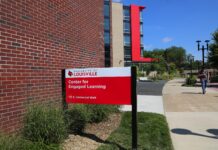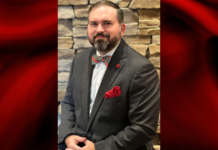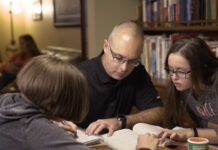Those were some of the sentiments that came out of a public discussion Do Words Matter in Political Discourse? A Community Discussion, Jan. 24, at the University of Louisville.
U.S. Rep. John Yarmuth (Kentucky 3rd District), outgoing Kentucky Secretary of State Trey Grayson and UofL political science professor Jasmine Farrier discussed, among other things, whether vitriolic political discourse can lead to physical violence, such as the Jan. 8 shooting of Arizona Rep. Gabrielle Giffords and 18 others outside a Tucson, Ariz. grocery store where she was having her first Congress on Your Corner public gathering of the year.
There is no evidence that political rhetoric led to the attacks, Yarmuth said in his opening remarks but noted that the silver lining in the tragedy is that public discourse could become more civil and meaningful.
Each panelist made an opening statement and then took questions from audience members and from moderator Mark Hebert, director of media relations for UofL.
They discussed the different roles and natures of the public, media and politicians; looked back at previous violence in U.S. history; talked about the changes in political parties and the inability of some citizens and some politicians to distinguish between politics and policies; and suggested ways that people can make sure that political discourse becomes more than catch phrases and hateful rhetoric.
In his opening remarks, Grayson, who leaves state office Jan. 31 to direct Harvard University’s Institute of Politics, said that all elected officials are at times guilty of using inflammatory language.
Agreeing that it is important to use more civility in political discourse, he noted that what we need to be careful not to do is use this as a reason not to have forceful conversation. People should not stop standing up for what they believe, he explained, but they should look for common ground and ways to work together.
Throughout the 90-minute program, Farrier reminded her fellow panelists and the audience that strong and sometimes violent discourse has been part of American history since as far back as the presidency of Thomas Jefferson, when political reporters wrote in strong words that he would ruin the country.
Each panelist said that one way to build productive dialogue is through education. People should learn about the issues, Farrier said, and divorce themselves from the entertainment that comes from inflammatory rhetoric and confrontation.
Read other viewpoints, Grayson added, and do a better job teaching kids about civics so they know how the process should work. And keep coming to events like this to hold people like John and me accountable.
Fact-check the information received, Yarmuth said. Whether it’s information that’s online or something that comes via e-mail from a friend, your obligation when you get it is to check it, he said, adding that if it’s untrue, people should let the person who sent it know.
And, in your daily discussions, think about the Golden Rule. If you think something that, if said about you, would be unfair, don’t say it, Yarmuth said.
































